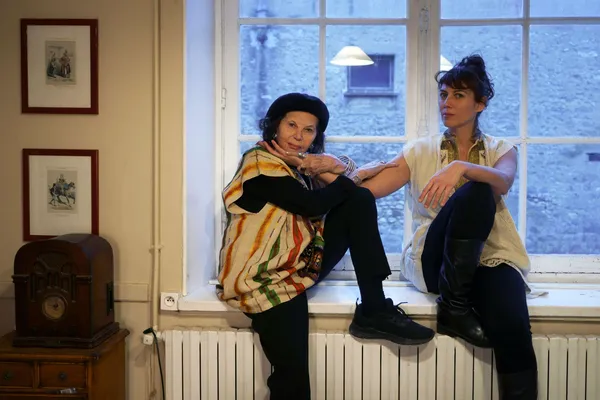 |
| Claudia Squitieri with her mother Claudia Cardinale on Werner Herzog’s Fitzcarraldo: “it’s one of her most adventurous experiences.” Photo: courtesy of Claudia Squitieri |
In the second instalment with Claudia Squitieri (curator of the book Claudia Cardinale. L’indomabile. The Indomitable, published by Cinecittà and Electa Editore) we discuss more of the films her mother, Claudia Cardinale, starred in. Werner Herzog, Klaus Kinski, Mick Jagger, Jason Robards, Thomas Mauch, My Best Fiend, and filming Fitzcarraldo; encountering Fernando Trueba (The Artist And Model) in Deauville and reconnecting with Jean Rochefort; Manoel de Oliveira and an “atmosphere of mysticality” during the making of Gebo and the Shadow with Jeanne Moreau and Michael Lonsdale, shot by Renato Berta; Blake Edwards and The Pink Panther, the problem with sequels and playing Roberto Benigni’s mother in Son Of The Pink Panther all came up in our conversation.
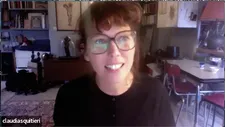 |
| Claudia Squitieri from Paris on Roberto Benigni with Claudia Cardinale: “He was going “Claudia!!!!” Jumping around every time he saw my mother.” Photo: Anne-Katrin Titze |
Cinecittà and the Museum of Modern Art in New York are currently celebrating the career of Claudia Cardinale with a 23 film retrospective, including 17 restorations through Tuesday, February 21. Claudia Cardinale: “I am happy to hear that I am still in the thoughts of audiences all over the world, especially here in Rome and, very soon, in New York. I don’t have a favourite film per se among the many that I've shot – it would be like choosing between your own children – but certainly Bebo’s Girl clearly represents that ‘indomitable’ side of my character that I have always wanted to listen to, and which allowed me to experience great emotions. My next project, shared with my daughter and son, Claudia and Patrick, is to create a foundation in my name and open our home to artists from all over the world.”
Cinecittà CEO Nicola Maccanico: “We are proud to present this important new restoration at MoMA in New York, our prestigious partner for many years, along with other films that showcase the skill, beauty and modernity of Claudia Cardinale, one of the greatest actresses in existence. A very important mission of Cinecittà is to bring into the world the greatness of Italian cinema of yesterday and today. The retrospective of Claudia Cardinale is a celebration of talent and Cinecittà today is increasingly the home where talented artists can build their dreams and bring them to audiences around the world.”
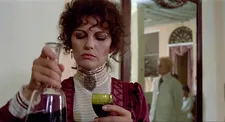 |
| Claudia Cardinale with Klaus Kinski in Werner Herzog’s Fitzcarraldo |
MoMA Curator in the Department of Film Josh Siegel: “Celebrating a living artist is an extraordinary tribute that MoMA has dedicated to a very select few, of which Claudia Cardinale is a splendid representative. Her skill surpasses, if possible, her undisputed beauty. She has been sought after by directors all over the world for the nuances she knew how to infuse in her characters. We are excited to present our audiences with an opportunity to admire her in her Italian and international works, thanks to the collaboration with Cinecittà which, every year, allows us to propose the best of Italian cultural production, in beautifully restored versions.”
Pietro Germi’s Un Maledetto Imbroglio (The Facts Of Murder, 1959); Mauro Bolognini’s Il Bell’Antonio (Handsome Antonio, 1960), La Viaccia (The Lovemakers, 1962), and Senilità (Careless, 1962); Valerio Zurlini’s La Ragazza Con La Valigia (Girl With A Suitcase, 1961); Luchino Visconti’s Rocco E I Suoi Fratelli (Rocco And His Brothers, 1960), Il Gattopardo (The Leopard, 1963) Sandra (1965); Federico Fellini’s Otto E Mezzo (8 1⁄2, 1963); Sergio Leone’s Once Upon A Time In The West (1968); Marco Bellocchio’s Enrico IV (Henry IV, 1984); Pasquale Squitieri’s Atto Di Dolore (1990), and Manoel de Oliveira’s O Gebo E A Sombra (Gebo And The Shadow, 2012) are some of the many highlights.
From Paris, the week before the book launch at the Italian Cultural Institute, Claudia Squitieri joined me on Zoom for the conclusion of our in-depth conversation on the life and career of Claudia Cardinale.
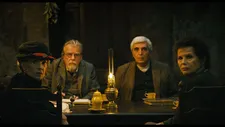 |
| Jeanne Moreau, Michael Lonsdale, Luís Miguel Cintra and Claudia Cardinale in Manoel de Oliveira’s Gebo And The Shadow |
Anne-Katrin Titze: I remember your mother being interviewed by Werner Herzog in his documentary on Klaus Kinski, called My Best Fiend. She talks about filming Fitzcarraldo and the fantastic scene with Kinski and the baby ocelot. Any stories about Fitzcarraldo?
Claudia Squitieri: I think till today, it’s one of her most adventurous experiences. There are other travels which were a shock, but that one was crazy. And as you know, it started out with Mick Jagger in the cast and I think it was Jason Robards, who was supposed to do the main role. And he was going crazy, there was nothing to eat and finally he went up a tree and his psychologist had to come from the US to bring him down.
And then Mick Jagger couldn’t continue because he had to catch a tour he had to do. The whole experience was crazy. I got to meet personally some years ago Thomas Mauch, who was the director of photography during the film. And, as you know, the crew was very very very small.
My mother doesn’t have such a big big role in it, but at the same time, what happened was that the Indios, the autochtones, they kind of were calmed by this image of my mother. Because she appeared in these white dresses and they thought that she was like an apparition of I don’t know what.
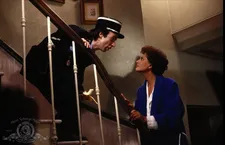 |
| Roberto Benigni with Claudia Cardinale in Blake Edwards’ Son Of The Pink Panther |
So Werner Herzog was actually asking my mother to be present more than she should have done. In order to calm the population there. There were many misadventures there and even a life taken from the craziness of the whole project. At the same time it will remain as an ovni in cinema because it’s beyond a film, it’s an adventure.
AKT: I remember your mother also in Fernando Trueba’s The Artist and Model in 2012, where she has a beautiful role.
CS: Yes, it was very pretty and the encounter with Trueba happened during the American Festival in Deauville. We were having a great time; I was there too. Trueba must have been part of the jury, as was my mother. He is such a spontaneous and creative person and in love with music; as you know he did a lot of films on music.
AKT: He’s a lovely man, I had the chance to talk with him twice.
CS: So with Fernando we stayed in touch and quite a few years later, he came up with this role for Claudia and obviously she was delighted that such an encounter, which was, not random, but it came from life experience, like we were having dinner, drinking wine and then years later… Also it was a great opportunity for my mother to reconnect with Jean Rochefort whom she had played with but never in such an intimate manner in a way. It had been many years and he was such a gentleman.
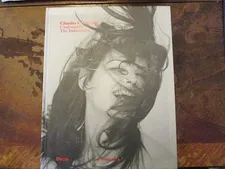 |
| Claudia Cardinale. L’indomabile. The Indomitable book, curated by Claudia Squitieri Photo: Anne-Katrin Titze |
AKT: I saw that at MoMA Gebo and the Shadow will be shown, which has one of the great cinematographers, Renato Berta. Co-starring are Michael Lonsdale and Jeanne Moreau. How was that shoot?
CS: I also personally met Manoel de Oliveira for another project I had and I went to see him. He was like a history book of his own. He started out with black and white silent films. He traversed the whole century. The encounter with my mother - it was an intimate film, it was a difficult film to shoot, because it was very intense with a lot of dialogue and about this feeling of just being closed up in a family. It was a beautiful experience for my mother.
They shot it outside Paris in studios. It’s a very peculiar little film, very much you can feel that Manoel de Oliveira is facing death in some way. He was very fervent in the last parts of his life, and so was Michael Lonsdale, so there was quite an atmosphere of mysticality during that film. It was very spiritual and almost like a testament of something very moral, spiritual
AKT: It feels very enclosed, almost claustrophobic and at the same time as though all the ghosts and spirits were entering this singular place.
CS: Exactly, that’s why I’m saying very spectral. It has something for sure of very old age. It surely has something of death. You can feel there is something testamentary or at least he is addressing something spiritual through the film.
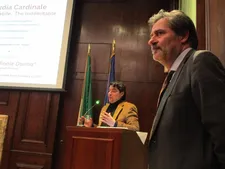 |
| Un Cardinale donna director Manuel Maria Perrone with Massimo Sarti, Attaché for Cultural Affairs at the Italian Cultural Institute in New York Photo: Anne-Katrin Titze |
AKT: Addressing something maybe not so spiritual, I want to talk about the Pink Panther movies! With David Niven on the ski slopes and Peter Sellers doing his thing! And in the later one, Son of the Pink Panther, Claudia Cardinale plays the mother of Roberto Benigni!
CS: Yes, it’s funny, my mother never really accepted to make number twos.
AKT: No sequels?
CS: She always said no to making The Leopard 2 or so. I think the first experience of The Pink Panther was fantastic and there is a funny anecdote. One day the director, Blake Edwards, he asked my mother to sit in a room. In this room there was a man smoking and there was a very big dog. And at one point the dog kind of fell over. It was before the drunk scene and the guy was smoking hashish.
So as soon as the dog fell, basically he knew that my mother had inhaled enough drugs, so she was ready to do the scene. And my mother was completely anti drugs, she never even had a puff of anything. That’s how Blake Edwards tricked her into getting stoned to do that scene. I was actually at the shoot partially of The Pink Panther 2.
I was very young but I followed my mother on that set. The reason really why mother accepted it was sharing it with Benigni. Who was and is such a vital, funny, loving, caring, exploding figure. He was going “Claudia!!!!” Jumping around every time he saw my mother. It’s difficult to do number twos. Now in our younger generations it’s an exercise which has become something that can be good, like Ocean’s Eleven, Ocean’s 12. They know how to do it, but at the time it wasn’t such an exercise. You’d have Rambo. On quality films it was something quite obsolete.
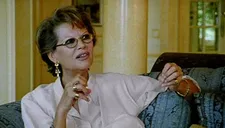 |
| Claudia Cardinale in Werner Herzog’s Klaus Kinski documentary My Best Fiend |
Read what Claudia Squitieri had to say on working with Luchino Visconti and Federico Fellini; costume designers Piero Tosi and Milena Canonero; Franco Cristaldi’s production company; Fondazione Claudia Cardinale - Fondation CC, and her role as the curator of the book Claudia Cardinale. L’indomabile. The Indomitable (Cinecittà and Electa Editore).
“Claudia Cardinale” runs through Tuesday, February 21 and is produced by Cinecittà and the Department of Film, the Museum of Modern Art in collaboration with the Italian Cultural Institute. The retrospective has been organized by Paola Ruggiero and Camilla Cormanni, Cinecittà and Joshua Siegel, Curator, Department of Film, The Museum of Modern Art. Thanks to Claudia Squitieri and Fabio Finotti, Director of the Italian Cultural Institute in New York.





















